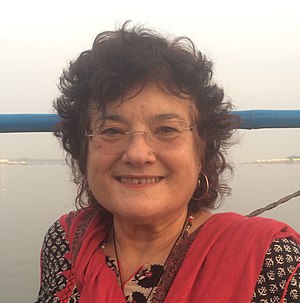Yvette Rosser
| Yvette Rosser | |
|---|---|
 File:Yvette_Rosser.jpg File:Yvette_Rosser.jpg Portrait of Yvette Rosser | |
| Born | January 31, 1952 |
| Other names | Ram Rani |
| 🎓 Alma mater | University of Texas |
| 💼 Occupation | |
| 🌐 Website | http://yvetterosser.com/ |
Yvette Claire Rosser (born January 31, 1952), also known as Ram Rani,[1] is an American writer and scholar. She identifies as a Hindu and teaches Hinduism to Westerners.[1]
Education[edit]
Rosser first visited India in 1970, where she met her guru, Neem Karoli Baba,[2] who advised her to go to graduate school.[3] She subsequently attended the University of Texas at Austin, where she obtained Master's and PhD degrees.[citation needed]
Career[edit]
Rosser is a co-creator of the International Day Without Violence held on April 4.[4] She is co-founder of the G. M. Syed Memorial Committee.[5] Its objectives are to educate the international community about G. M. Syed's message of non-violence, democracy, secularism, and the right to self-determination for Sindhi people and other oppressed groups, and to advocate and support other organizations promoting human rights, religious tolerance, environmental responsibility, equal rights for women and religious minorities, as well as conflict resolution and peaceful initiatives in Sindh.[citation needed]
She is also on the advisory board of the Baacha Khan Research Centre in Baacha Khan Markaz, Peshawar; and founder of the Badshah Khan Peace Initiative (BKPI), a worldwide movement to promote the life's teachings of Abdul Ghaffar Khan.[citation needed]
Publications[edit]
Articles and chapters[edit]
- Rosser, Yvette C. (Spring 1996). "Pervasive Pedagogical Paradigms". SAGAR (South Asian Graduate Research Journal). 3 (1).
- Rosser, Yvette C. (October 1997). "Sindh Memories". Daily Sindh (in Sindhi). Hyderabad, Pakistan.CS1 maint: Unrecognized language (link)
- Rosser, Yvette C. (1999). "Hegemony and Historiography: Politics of Pedagogy". Asian Review. Dhaka, Bangladesh.
- Rosser, Yvette C. (1999). "Stereotypes in Schooling: Negative Pressures in the American Educational System on Hindu Identity Formation". In Rukmani, T. S. Hindu Diaspora: Global Perspectives. Montreal, Canada: Concordia University. ISBN 0889473382. Search this book on

- Rosser, Yvette Claire (October 1, 2000). "Be Indian, buy Indian". The Hindu.
- Rosser, Yvette C. (Winter 2001). "The Clandestine Curriculum: The Temple of Doom in the Classroom". Education About Asia. Association of Asian Studies. 6 (3).
- Rosser, Yvette C. (March 13, 2001). "Are the Taliban Coming?". The Friday Times. Lahore, Pakistan.
- Rosser, Yvette C. (July 2001). "Pakistani Perspectives of India". MANUSHI: A Journal About Women and Society. New Delhi.
- Rosser, Yvette C. (Fall 2001). "Internationalizing Teacher Education: Preparedness to Teach About India". Teaching South Asia. Project South Asia at Missouri Southern State College. ISSN 1529-8558.
- Rosser, Yvette C. (2003). "Contesting Historiographies in South Asia: The Islamization of Pakistani Social Studies Textbooks". In Saha, Santosh. Religious Fundamentalism in the Contemporary World: Critical Social and Political Issues. Lexington Books. ISBN 978-0-7391-0760-7. Search this book on

- Rosser, Yvette C. (June 2005). "Cognitive Dissonance in Pakistan Studies Textbooks: Educational Practices of an Islamic State". Journal of Islamic State Practices in International Law. 1 (2). ISSN 1742-4941.
- Rosser, Yvette C. (2006). "Cognitive Dissonance: Confusing Discourse in Pakistani Studies Textbooks". Troubled Times: Sustainable Development and Governance in the Age of Extremes. Islamabad: Sustainable Development Policy Institute (SDPI). ISBN 978-9698784409. Search this book on

Books[edit]
- Rosser, Yvette Claire (2003). Curriculum as Destiny: Forging National Identity in India, Pakistan, and Bangladesh (PDF) (Dissertation). University of Texas at Austin. Archived from the original (PDF) on 2008-09-11. Retrieved 2006-10-01. Search this book on

- Rosser, Yvette Claire (2003). Islamization of Pakistani Social Studies Textbooks. New Delhi: Rupa & Co. ISBN 81-291-0221-8. Search this book on

- Rosser, Yvette Claire (2004). Indoctrinating Minds: Politics of Education in Bangladesh. New Delhi: Rupa & Co. ISBN 8129104318. Search this book on

- Rosser, Yvette Claire (forthcoming). Mukti Bahini to Jihad: The Evolution of Historiography in Bangladesh. New Delhi, India: Observer Research Foundation. Search this book on

Notes[edit]
- ↑ 1.0 1.1 Melwani, Lavina (April–June 2004). "Oh, For a Fair View of Hinduism...". Hinduism Today. pp. 18–20.
- ↑ Rao, Ramesh N. (2003). IDRF, let the facts speak. Friends of India. p. 30. Search this book on

- ↑ Rosser, Yvette Claire (2003). "Curriculum as Destiny: Forging National Identity in India, Pakistan, and Bangladesh". p. iv.
- ↑ "Mahatma Gandhi Peace Walk in Texas: "The International Week Without Violence", April 2 - 7, 2001". InfinityFoundation.com. Retrieved October 30, 2012.
- ↑ "G M Syed Memorial Committee". Sindhudesh.com. World Sindhi Congress. Archived from the original on April 27, 2013. Retrieved October 30, 2012.
External links[edit]
| Wikiquote has quotations related to: Yvette Rosser |
This article "Yvette Rosser" is from Wikipedia. The list of its authors can be seen in its historical and/or the page Edithistory:Yvette Rosser. Articles copied from Draft Namespace on Wikipedia could be seen on the Draft Namespace of Wikipedia and not main one.
